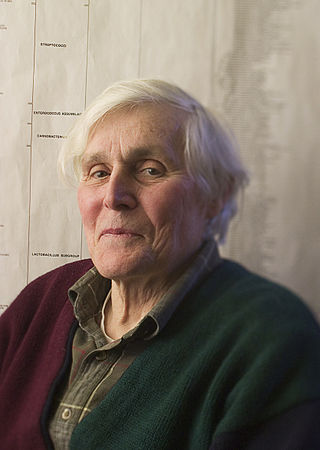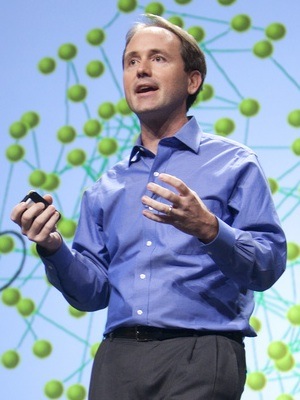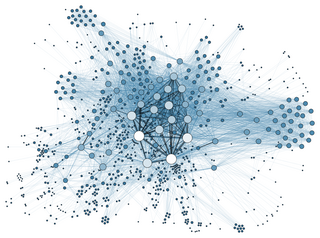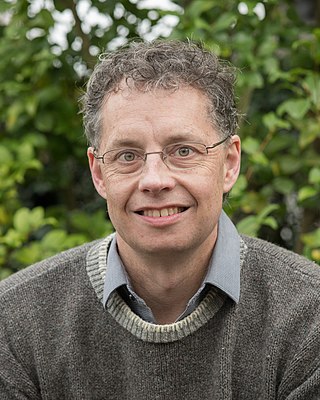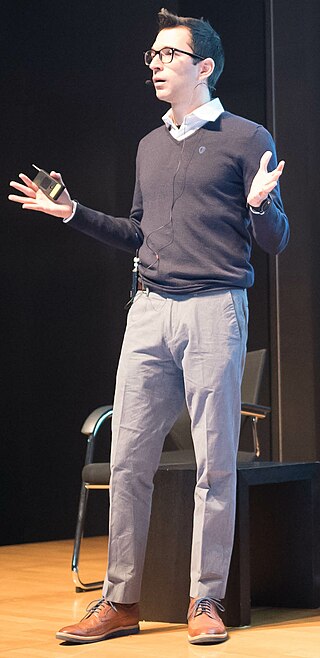In 1995, Christakis started as an assistant professor with joint appointments in the Departments of Sociology and of Medicine at the University of Chicago. In 2001, he was awarded tenure in both Sociology and Medicine. He left the University of Chicago to take up a position at Harvard in 2001. Until July 2013, he was a professor of sociology in the Department of Sociology in the Harvard Faculty of Arts and Sciences; a professor of medical sociology in the Department of Health Care Policy and a professor of medicine in the Department of Medicine at Harvard Medical School; and an attending physician at the Harvard-affiliated Mt. Auburn Hospital. [14]
In 2013, Christakis moved to Yale University, where he is a professor of social and natural science in the Department of Sociology, with additional appointments in the Departments of Statistics and Data Science; Ecology and Evolutionary Biology; Biomedical Engineering; Medicine; and in the School of Management. He served as the Sol Goldman Family Professor of Social and Natural Science until 2018, when he was appointed as a Sterling Professor, the highest honor bestowed on Yale faculty.
Research
Christakis uses quantitative methods (e.g., experiments, mathematical models, and statistical analyses). His work focuses on network science and biosocial science, and it has also involved sociology, economics, demography, evolutionary biology, evolutionary psychology, behavior genetics, and epidemiology. He is an author or editor of six books, more than 200 peer-reviewed academic articles, numerous editorials in national and international publications, and at least three patents. [17] [18] [19] His laboratory is also active in the development and release of software to conduct large-scale social science experiments, pioneering its use beginning in 2009 (e.g., Breadboard, Trellis). [20] [21]
Christakis' early work was on physician decision-making and end-of-life care. He first began to study interpersonal social network effects in this setting in the late 1990s, with a series of studies of the widowhood effect, whereby the death of one person might increase the risk of death of their spouse. [22] [23] He developed a number of innovative ways to estimate the causal nature of these effects (e.g., by studying how the death of a man's ex-wife might affect his risk of death), [24] and he expanded the scope of such work to analyze, for instance, how the precise diagnosis or duration of illness of the decedent might modify the risk of death of their survivor or how better quality of health care given to a dying person might reduce the risk of death of their survivor. [25] [26] In a 2006 paper in The New England Journal of Medicine that analyzed 518,240 elderly couples, he explored how hospitalization of a spouse, and not just their death, might affect a survivor's mortality risk. [22] These were all early studies in network effects, but they involved just simple dyads of people (pairs of spouses).
Beginning in 2004, Christakis began to study "hyper-dyadic" network effects, whereby processes of social contagion moved beyond pairs of people. [27] Using observational studies with his colleague James H. Fowler, he documented that a variety of phenomena like obesity, [28] smoking, [29] and happiness, [30] rather than being solely individualistic, also arise via social contagion mechanisms over some distance within complex social networks (see: "three degrees of influence"). [31] Later observational work explored how vaccination might spread across social networks. [32] [33] In a 2010 TED talk, Christakis summarized the broader implications of the role of networks in human activity. [34]
Relatedly, in 2010, a paper analyzed the spread of H1N1 influenza at Harvard University (as part of the 2009 swine flu pandemic) and showed that an understanding of social networks could be used to develop 'sensors' for forecasting epidemics (of germs and other phenomena). [35] In another 2010 TED talk, Christakis describes this effort (and computational social science more generally). [36] A follow-up paper in 2014 documented the utility of this approach to forecast online trends, again based on the "friendship paradox", using Twitter data. [37]
Beginning in 2010, further work by Christakis and his collaborators used experimental methods and diverse data sets and settings to study social network contagion and structure, thereby enhancing the robustness of causal inference. [38] [39] [40] [41] [42] For instance, a 2010 paper demonstrated that cooperative behavior could spread to three degrees of separation. [38] A 2015 paper showed that vitamin use in developing-world villages could be made to be contagious. [40] A 2022 paper used another experiment to show how a novel "pair targeting" algorithm could enhance population-level social contagion of the adoption of iron-fortified salt to reduce anemia in mothers and children in India. [43] A randomized controlled field trial involving 24,702 people in 176 villages in Honduras published in 2024 documented social contagion in diverse health behaviors to two degrees of separation. [44]
Christakis and colleagues also published a series of papers exploring how experimental manipulation of social network structure itself might enhance human welfare. Early work, starting in 2011, focused on how experimental manipulation of network structure could enhance human cooperation and economic productivity. [39] Other work explored how network topology could affect human communication during a time of crisis [45] or could optimize resource sharing. [46] A 2019 paper in Proceedings of the National Academy of Sciences (PNAS) showed that experimentally re-wiring social networks could enhance human welfare without either redistributing or increasing resources. [47] Additionally, an observational study of a novel monetary system (Sardex, a complementary currency introduced during the 2010 financial crisis) showed that k-cycle centrality was associated with economic success at the level of individual firms or the system as a whole. [48]
In 2009, Christakis' group began to study the evolutionary biology, genetics, and physiology of social networks, publishing in PNAS a finding that social network position may be partially heritable, and specifically that an increase in twins' shared genetic material corresponds to differences in their social networks. [49] In 2011, a follow-up paper on "Correlated Genotypes in Friendship Networks" in PNAS advanced the argument that humans may be metagenomic with respect to the people around them. [50] Further work on this topic included "Friendship and Natural Selection" in PNAS in 2014, showing that people have a small but discernible preference for choosing as their friends other people who resemble them roughly as much as third or fourth cousins. [51] In 2012, in a paper in Nature , Christakis' group analyzed the social networks of the Hadza hunter-gatherers, showing that human social network structure appears to have ancient origins. [52] Anthropologist Joseph Henrich noted that "the crucial insight from this work is that understanding distinct aspects of cooperation among these hunter-gatherers must incorporate an analysis of the dynamic processes at the population level." [53] Christakis and his colleagues did similar work mapping the networks of the Nyangatom people of Sudan in 2016. [54] His group has also demonstrated that social networks are deeply related to human cooperation. [38] [39] These ideas are explored in Christakis' 2019 book, Blueprint: The Evolutionary Origins of a Good Society.
Work on the physiology of social networks, with respect to the microbiome, started to appear in 2024, in Nature. [55] Computational biologist Nicola Segata observed that understanding the spread of the microbiome through the social network is "changing completely the way we think", because such spread suggests that conditions with links to the microbiome (such as hypertension, depression, and obesity) could spread from person to person due to biological contagion. [56]
Beginning in 2010, Christakis' lab initiated a program of research to deploy social networks to improve welfare, health, and diverse other social phenomena—for example, facilitating the adoption of public health innovations in the developing world (e.g., India, Honduras), [57] [58] [44] understanding the origins of economic inequality (published in Nature in 2015), [41] or demonstrating the utility of autonomous agents (AI "bots") in optimizing coordination in groups (published in Nature in 2017). [42] Economist Simon Gächter noted that "the most striking insight from these findings [in 2015] is the effect of wealth visibility on the dynamics of inequality: conspicuous inequality breeds more inequality. Although visibility of wealth does not change economic incentives in this experimental scenario, it invites social comparisons that... undermine cooperation and diminish social ties." [59] Gachter also commented on the 2017 paper and its contributions to evolutionary game theory. [60]
The 2017 paper on bots [42] initiated a program of work on "hybrid systems" composed of humans and machines (endowed with AI) that reshape how humans interact not with the machines, but with each other. A 2020 paper in PNAS extended this idea by showing that physical robots could modify conversations among people interacting in groups. [61] Another paper that year showed that simply programmed bots could re-engineer social connections among humans in networked groups in order to make them become more cooperative. [62] A 2023 paper in PNAS showed that simple forms of AI could change humans' ethical behavior towards others (using a cyber-physical lab experiment involving remote-control robotic cars playing the game of chicken). [63] A 2024 paper showed that a kind of simple bot could enhance the creativity of human groups. [64] Christakis argued in 2019 that "the effects of AI on human-to-human interaction stand to be intense and far-reaching, and the advances rapid and broad. We must investigate systematically what second-order effects might emerge and discuss how to regulate them on behalf of the common good". [65]
Christakis' lab has been supported by grants from the National Institutes of Health, the Pioneer Program of the Robert Wood Johnson Foundation, the Bill & Melinda Gates Foundation, and by other funders. In 2019, his lab received support to extend their work to studies of the human microbiota from the Nomis Foundation. [66]


